-
About
- About Listly
- Community & Support
- Howto
- Chrome Extension
- Bookmarklet
- WordPress Plugin
- Listly Premium
- Privacy
- Terms
- DMCA Copyright
- © 2010-2025 Boomy Labs

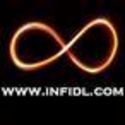 ReviewsIN
ReviewsIN
Listly by ReviewsIN
Discover the best Children's Science Biographies in Best Audio Books. Find the top 100 most popular items in Amazon Books Best Sellers
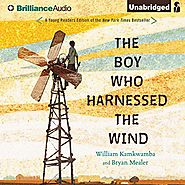
Now a Netflix film starring and directed by Chiwetel Ejiofor, this is a gripping memoir of survival and perseverance about the heroic young inventor who brought electricity to his Malawian village.
When a terrible drought struck William Kamkwamba's tiny village in Malawi, his family lost all of the season's crops, leaving them with nothing to eat and nothing to sell. William began to explore science books in his village library, looking for a solution. There, he came up with the idea that would change his family's life forever: he could build a windmill. Made out of scrap metal and old bicycle parts, William's windmill brought electricity to his home and helped his family pump the water they needed to farm the land.
Retold for a younger audience, this exciting memoir shows how, even in a desperate situation, one boy's brilliant idea can light up the world.
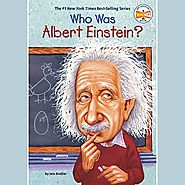
*Everyone has heard of Albert Einstein - but what exactly did he do? How much do kids really know about Albert Einstein besides the funny hair and genius label? *
For instance, do they know that he was expelled from school as a kid? Finally, here's the story of Albert Einstein's life, told in a fun, engaging way that clearly explores the world he lived in and changed.
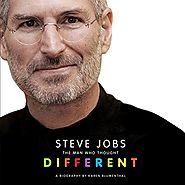
"Your time is limited... have the courage to follow your heart and intuition."
-Steve Jobs
From the start, his path was never predictable. Steve Jobs was given up for adoption at birth, dropped out of college after one semester, and at the age of 20, created Apple in his parents' garage with his friend Steve Wozniack. Then came the core and hallmark of his genius - his exacting insistence on perfection, his counterculture life approach, and his level of taste and style that pushed all boundaries. A devoted husband, father, and Buddhist, he battled cancer for over a decade, became the ultimate CEO, and made the world want every product he touched.
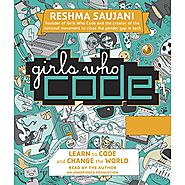
Part how-to, part girl empowerment, and all fun, from the leader of the movement championed by Sheryl Sandberg, Jack Dorsey, and other giants of tech.
Since 2012 the organization Girls Who Code has taught computing skills to and inspired over 10,000 girls across America. Now its founder, Reshma Saujani, wants to inspire you to be a girl who codes! Bursting with down-to-earth explanations of coding principles and real-life stories of girls and women working at places like Pixar and NASA, this book shows what a huge role computer science plays in our lives and how much fun it can be. No matter your interest - sports, the arts, baking, student government, social justice - coding can help you do what you love and make your dreams come true. Whether you're a girl who's never coded before, a girl who codes, or a parent raising one, this entertaining audiobook will have you itching to create your own apps, games, and robots to make the world a better place.
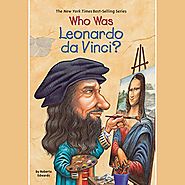
Leonardo da Vinci was a gifted painter, talented musician, and dedicated scientist and inventor, designing flying machines, submarines, and even helicopters. Yet he had a hard time finishing things, a problem anyone can relate to. Only 13 paintings are known to be his; as for the illustrated encyclopedia he intended to create, all that he left were thousands of disorganized notebook pages. Here is an accessible portrait of a fascinating man who lived at a fascinating time - Italy during the Renaissance.
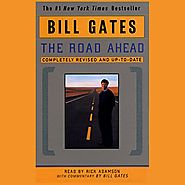
Bill Gates, whose vision of the personal computer propelled Microsoft into one of the world's leading companies, astonished the business community in 1996 by abruptly reinventing his entire company around the Internet.
Gates explains why the Internet has revolutionized not just Microsoft but everything else too - and at a faster pace than even he had anticipated. He describes the implications for everybody of a world connected by interactive computer networks and addresses our most pressing questions.
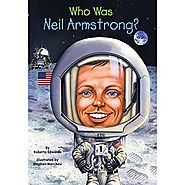
On July 20, 1969, Neil Armstrong stepped on the moon and, to an audience of over 450 million people, proclaimed his step a giant leap for mankind. This Eagle Scout built his own model planes as a little boy and then grew up to be a test pilot for experimental aircraft before becoming an astronaut.
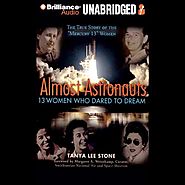
Have you ever heard of the "Mercury 13" women? Did you know that nearly twenty years before the first women were let into NASA's astronaut program, there were others who tried?
What are the requirements for being shot into space, piloting a hunk of metal while carrying the hopes and fears of your nation? Mastery of flying, as well as courage, intelligence, resistance to stress, and fitness - any checklist would certainly include these. But when America created NASA in 1958, there was an unspoken rule in place: astronauts must be male, and they must be white.
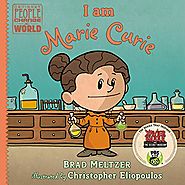
The first woman to win a Nobel Prize, physicist and chemist Marie Curie is the 19th hero in the New York Times best-selling book biography series about heroes.
This friendly, fun biography series focuses on the traits that made our heroes great - the traits that kids can aspire to in order to live heroically themselves. Each book tells the story of one of America's icons in a lively, conversational way that works well for the youngest nonfiction listeners and that always includes the hero's childhood influences
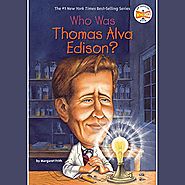
One day in 1882, Thomas Edison flipped a switch that lit up lower Manhattan with incandescent light and changed the way people live ever after. The electric light bulb was only one of thousands of Edison's inventions, which include the phonograph and the kinetoscope, an early precursor to the movie camera. As a boy, observing a robin catch a worm and then take flight, he fed a playmate a mixture of worms and water to see if she could fly! An accessible, appealing biography of the inventor.
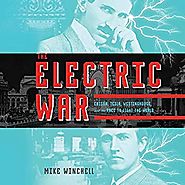
In the mid- to late-19th century, a burgeoning science called electricity promised to shine new light on a rousing nation. Inventive and ambitious minds were hard at work. Soon that spark was fanned, and a fiery war was under way to be the first to light - and run - the world with electricity.
Thomas Alva Edison, the inventor of direct current (DC), engaged in a brutal battle with Nikola Tesla and George Westinghouse, the inventors of alternating current (AC). There would be no ties in this race - only a winner and a loser - and the prize was a nationwide monopoly in electric current
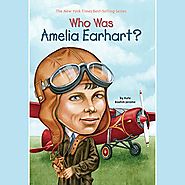
Amelia Earhart was a woman of many "firsts." In 1932, she became the first woman to fly solo across the Atlantic Ocean. In 1935, she also became the first woman to fly across the Pacific. From her early years to her mysterious 1937 disappearance while attempting a flight around the world, listeners will find Amelia Earhart's life a fascinating story.
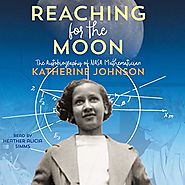
The inspiring autobiography of NASA mathematician Katherine Johnson, who helped launch Apollo 11.
As a young girl, Katherine Johnson showed an exceptional aptitude for math. In school, she quickly skipped ahead several grades and was soon studying complex equations with the support of a professor who saw great promise in her. But ability and opportunity did not always go hand in hand. As an African American and a girl growing up in an era of brutal racism and sexism, Katherine faced daily challenges. Still, she lived her life with her father's words in mind: "You are no better than anyone else, and nobody else is better than you."
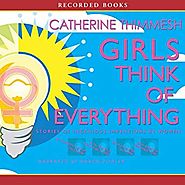
Did you know Toll House Cookies were created accidentally in an old Toll House in Massachusetts by a woman hurrying to make a tasty snack for her patrons? And did you know that Liquid Paper (or "white-out") was invented because of one small typing mistake? Often overshadowed by famous male inventors, women have also made many significant contributions to science and industry.
This audiobook profiles women like Stephanie Kwolek who created Kevlar body armor. You'll also hear about women like Ruth Wakefield, whose Toll House Cookie recipe has satisfied the sweet tooth of millions, and Grace Murray Hopper, a mathematician and Navy officer who pioneered the science of computer programming.
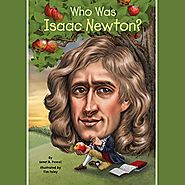
Isaac Newton was always a loner, preferring to spend his time contemplating the mysteries of the universe. When the plague broke out in London in 1665 he was forced to return home from college.
It was during this period of so much death that Newton gave life to some of the most important theories in modern science, including gravity and the laws of motion.